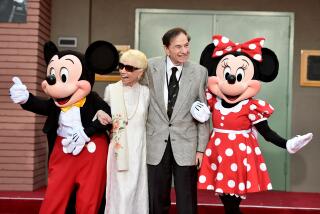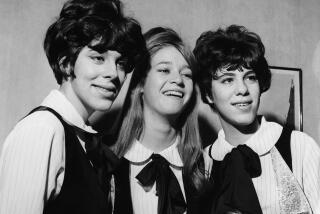Don Kirshner, rock producer and promoter, dies
- Share via
Don Kirshner, the impresario behind Brill Building pop, the Monkees, the Archies and his own music- television show, has died of heart failure.
Kirshner was 77 and died in Boca Raton, Florida, according to a statement from his publicist cited by Billboard.com. He was born on April 17, 1934, according to Ancestry.com, which would have made him 76.
Called “the man with the golden ear” by Time magazine in 1966, he wrote songs with Bobby Darin as a college student. In the late 1950s he co-founded Aldon Music, a publishing company whose songwriters included the hit-making teams of Gerry Goffin and Carole King, Barry Mann and Cynthia Weil, and Neil Sedaka and Howard Greenfield.
“Kirshner was like a father figure to us all,” Mann was quoted as saying in “The Rolling Stone Illustrated History of Rock and Roll” (1980). “Everyone’s first thought, as we sweated over our battered old pianos, was whether Donny would be pleased.”
After selling Aldon to Columbia Pictures, Kirshner moved into TV. He supervised the music for “The Monkees” and “The Archies” series and produced “Don Kirshner’s Rock Concert,” a live-performance television show.
Record labels were also part of his empire. The Beatles recorded “Chains,” a song originally released by his Dimension Records. Another of his labels, Kirshner Records, signed the band Kansas in the 1970s and had hit singles with “Carry On Wayward Son” and “Dust in the Wind.”
When “Rock Concert” ended in 1982, Kirshner retired. He made a comeback attempt two decades later with a publicly traded company, Kirshner International Inc., whose efforts to create an Internet TV channel and a media player were unsuccessful. He was in bankruptcy proceedings for six years, ending in 2008.
Kirshner was born to Gilbert and Belle Jaffe Kirshner in New York City’s Bronx borough. His father was a tailor. He attended Bronx High School of Science and Upsala College in East Orange, New Jersey.
Darin, another Bronx Science graduate, met him through a mutual friend. They teamed up to write radio commercials as well as songs. Connie Francis, who later had hit singles with Aldon, sang on some of the advertisements.
The duo pitched a song to Francis’s manager, George Scheck, and the attempt led to Darin’s signing with Decca Records. Decca dropped the singer after releasing four singles, and he moved to Atlantic Records’ Atco label with Kirshner’s help.
Five of their songs were included on Darin’s debut album, released in 1958. The partnership ended as the singer became more successful, although he married actress Sandra Dee in Kirshner’s apartment in 1960.
Kirshner also enabled Allen Klein, a fellow Upsala student, to get into the music business. Klein was hired as an accountant and later moved into management. He was the Beatles’ manager at the time of the band’s split.
To start Aldon, Kirshner joined forces with Al Nevins, a songwriter and musician. The company set up offices at 1650 Broadway in Manhattan, across the street from the Brill Building, a pop-music center since the 1930s.
“Donny would play one songwriter against another,” King was quoted as saying in “The Sociology of Rock,” a 1978 book by Simon Frith. “He’d say, We need a new smash hit,’ and we’d all go back and write a song.”
Works by Goffin and King included the Shirelles’ “Will You Love Me Tomorrow,” a No. 1 pop hit. Mann and Weil wrote another No. 1 single, the Righteous Brothers’ “You’ve Lost That Lovin’ Feeling,” with Phil Spector. Sedaka’s “Breaking Up Is Hard to Do” was written with Greenfield.
More to Read
The biggest entertainment stories
Get our big stories about Hollywood, film, television, music, arts, culture and more right in your inbox as soon as they publish.
You may occasionally receive promotional content from the Los Angeles Times.










